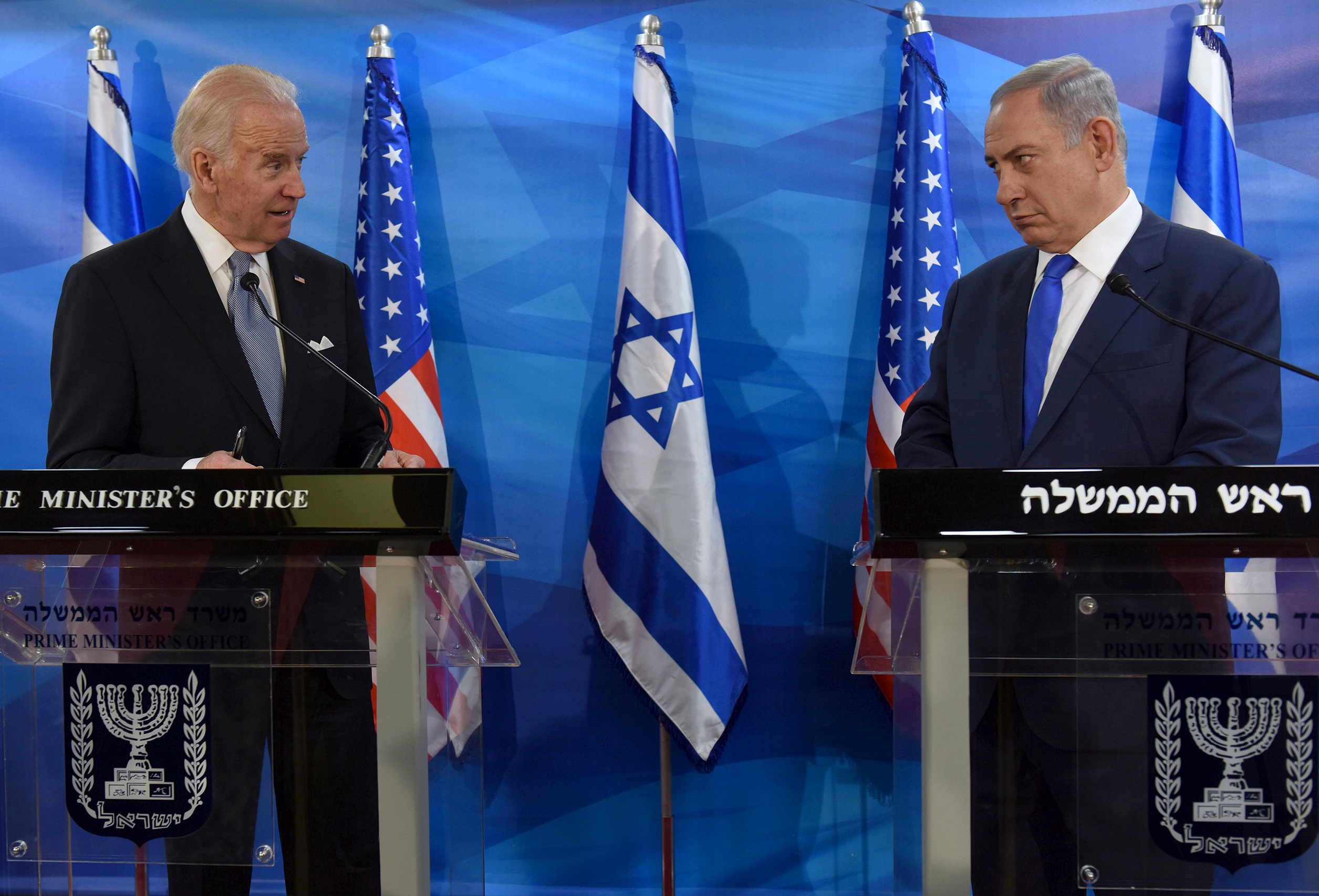Publications
INSS Insight No. 1882, July 21, 2024
When Prime Minister Netanyahu addresses a joint session of Congress on July 24, he will also be addressing the American Jewish community. This article describes American Jewish attitudes about the Israel-Hamas war, the Israeli government and the upcoming US elections. It shows that although American Jews strongly supported Israel throughout the war, they had many serious criticisms of the “full right” government prior to October 7. It also shows that most will support the Democratic nominee in the US presidential election in November. To encourage and deepen American Jewish support for Israel, Prime Minister Netanyahu should refrain from partisan appeals to Republicans in his speech, and instead reassure Americans that Israel remains fully committed to shared democratic values and a diplomatic path forward with the Palestinians.
When Prime Minister Netanyahu addresses the joint session of the United States Congress on July 24, he will have a second audience in mind: the 7.5 million members of the US Jewish community. Here is what he and other Israeli leaders should know about their views on the Israel–Hamas war, the Israeli government, and the upcoming US presidential elections.
Israel–Hamas War
In opinion surveys, American Jews have expressed strong support for Israel throughout the war. In a survey by the American Jewish Committee in May, 85% of Jewish respondents described US support for Israel as “important.” In a survey by Jewish Federations of North America in April, large majorities indicated support for Israel’s war aims, including conditioning a ceasefire on release of hostages (80%), removal of Hamas from power (73%), and disarming of the organization (67%).
The Pew Research Center fielded a rigorous survey in February with an oversample of American Jewish respondents. In that study, 89% of Jews described Israel’s reasons for fighting Hamas as “valid,” compared to 74% of white evangelicals—who were the next highest group—and 58% among all US adults surveyed. Similarly, 74% of Jewish respondents expressed support for US military aid to Israel, compared to 51% evangelicals and 36% of US adults. Jewish respondents were also the most likely group to express strong emotions about the war: 94% said it made them feel “sad” and 88% said it made them “angry.”
American Jewish support for Israel has also been displayed in solidarity rallies, including a March for Israel in November which drew nearly 300,000 participants. In the months since, American Jews have donated nearly a billion dollars through the Federation movement, and hundreds of millions more through other channels.
The extent of American Jewish support reflects patterns established during previous Gaza wars. It should not, however, be taken for granted. American Jews mostly identify as liberals and vote for the Democratic Party. Among Democratic voters, sympathy for Palestinians has increased in recent years, surpassing sympathy for Israel. American Jewish support for Israel is increasingly anomalous on the center-left of the political map. Moreover, American Jews are not a monolith. Jewish activists have also been a visible presence at pro-Palestinian demonstrations in major cities and on college campuses.

American Jewish support for Israel has endured despite surging antisemitism. In a recent Gallup survey, more than one-third of Jewish respondents reported poor treatment or harassment because of their religion during the past year, compared to 10% of US adults surveyed. In the same survey, 60% of American Jews reported feeling reluctant to share their religious affiliation for fear of harassment—more than double the share of US adults as a whole. Research by the Cohen Center for Modern Jewish Studies reports that Jewish college students linked rising antisemitism to the Israel–Hamas war rather than other more enduring causes. Regardless, the student respondents generally expressed strong feelings of connection to Israel.
Unfortunately, we have limited information about how American Jews assess criticism of Israel’s conduct during the war. In the Pew survey, Jewish respondents were more likely than US adults as a whole to describe the way Israel was then fighting the war as “acceptable” (62% vs. 38%). They were also more likely than US adults to favor humanitarian aid to Gazan civilians (61% vs. 50%). We do not have survey data, however, on what American Jews think about charges leveled against Israel for causing famine in Gaza, for carrying out war crimes, or for engaging in the crime of genocide. No survey has asked questions about those claims.
Israeli Government
The high level of wartime solidarity obscures fractures that have been accumulating beneath the surface. In the years leading up to the war, American Jews expressed mounting frustration with a range of Israeli policies. Such criticism intensified with the formation of the “full right-wing” government and will likely resurface when the war ends.
During 2023, most American Jews agreed with Israel’s protest movement that the Levin-Rothman judicial overhaul threatened Israeli democracy. Mainstream Jewish organizations, ordinarily reluctant to wade into Israeli politics, issued statements against the plan. Several large and influential organizations also issued statements against the inclusion of Jewish supremacists in the government and against extremist settler violence targeting Palestinians in the West Bank.

More generally, many American Jews expressed dismay over Israel’s failure to find a diplomatic alternative to the continued rule over millions of West Bank Palestinians. Although a minority supports the settlement enterprise, most favor negotiations toward a two-state solution. In the Pew survey, 46% favored two states compared to 22% who supported a single state under Israeli rule and 13% backing a single state governed jointly.
Criticism of Israel’s policies regarding the Palestinians has been especially common in the younger generation. This includes a large share of the future leaders of the community—rabbis and rabbinical students, communal professionals and educators, and artists and cultural elites. Among a small minority, it has fueled anti-Zionism and new efforts to envision a diaspora Judaism that does not have Israel at its center.
Finally, leaders of American Jewry’s largest religious streams—Reform and Conservative—criticized the government’s intolerance of religious pluralism, including efforts to impose Orthodox standards on conversions and reduce the scope of the Law of Return. For American Jews whose families often include Jews-by-choice and non-Jews, such measures threaten Jewish belonging and connection to Israel.
US Presidential Elections
At the time of this writing, President Biden remains the Democratic Party’s nominee despite a shaky debate performance and widespread calls to step aside.
However, Biden’s poll numbers have barely slipped since the debate. Party preference is particularly obstinate among American Jews. The last Republican to win a significant share of the Jewish vote was Ronald Reagan in 1980. Since then, Republican candidates have rarely won more than a quarter of Jewish votes. In 2020, Donald Trump won 22% of the Jewish vote compared to Biden’s 77%.

Recent polls have confirmed Jewish voters are tilting toward Biden. If he is on the ballot in November, he will likely win most Jewish votes, regardless of his perceived fitness for office. American Jews appreciate Biden’s support for Israel and vigorous denunciation of antisemitism. Mostly, however, they view Trump as an unstable, authoritarian figure who poses a genuine threat to American democracy. A minority, disproportionately Orthodox and Haredi, will vote for Trump, viewing him as more pro-Israel or better aligned with their conservative values. But most American Jews will vote for the Democratic nominee in November.
Recommendations
The strength and vitality of American Jewry is a moral interest and strategic imperative for Israel. American Jews are the most reliably pro-Israel segment of the US public. The fact that a majority consistently votes Democratic amplifies their strategic importance, as the party is increasingly divided over support for Israel. Were American Jews to waver, the Democratic Party would likely tip firmly against the Jewish state.
To encourage and deepen American Jewish support, Israeli leaders should consider the following:
- Champion continued bi-partisan support for the US–Israel alliance. Prime Minister Netanyahu’s 2015 speech to Congress against President Obama’s Iran nuclear policy was viewed by many at the time as a partisan maneuver to unleash Republican opposition. The prime minister’s popularity among American Jews took a hit and never recovered. In the upcoming speech, Netanyahu should avoid criticism of President Biden and the Democrats, particularly given the party’s vulnerability going into the upcoming elections. Even if Democrats lose the White House in November, they will remain one election cycle from potential resurgence, and their support is vital to Israel’s long-term security.
- Demonstrate continued Israeli commitment to the Biden administration’s priorities regarding the war, which are shared by most American Jews. This would entail visible measures to maximize the flow of humanitarian aid in Gaza and transition as rapidly as possible to civilian rule there. It would also entail efforts to achieve normalization with Saudi Arabia and a diplomatic horizon for the Israeli–Palestinian conflict.
- Reassure American Jews that Israel remains fully committed to shared democratic values, including strong independent courts, civic equality, religious pluralism, and rule of law. Repudiate extremist actions that signal a values gap between Israel and American Jewry.
- Express solidarity with American Jews who are confronting the worst outbreak of antisemitism in more than half a century, are impacted by the actions of Israel’s governments, and share a common fate with the Israeli people.
This publication was made possible by the partnership of the Ruderman Family Foundation.



